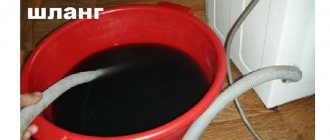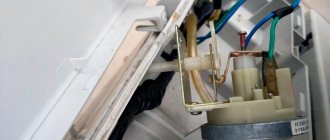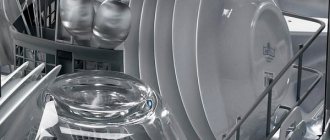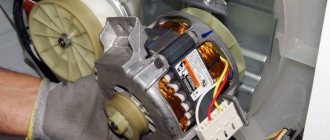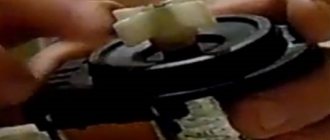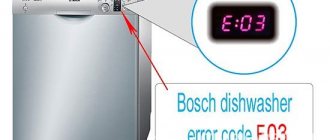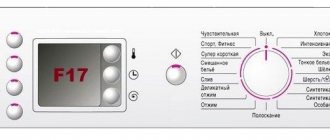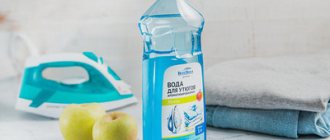Water hardness has a negative impact on the washing process in a machine; things do not return to their former appearance. Highly heated water during the operating cycle leaves scale that can damage individual elements of the unit. The heating element overheats and may even burn out. To make the process as efficient as possible, it is recommended to use a water softener for the washing machine. The aqueous medium, having become softer, will perfectly dissolve the powder in itself, wash things better without harming the machine.
Hard water that is not very hot will dissolve washing powder poorly. Soap sediment with grains of powder and particles of dirt settles on the parts; it can be distinguished on the walls of the container, drain filter, and cuffs made of rubber material. Water softening can improve dissolution and improve the quality of the washing process.
In addition, a humid environment promotes the growth of bacteria, which is a source of unpleasant odors. If you do not organize proper care, then all things will become saturated with such “aromas”.
Do I need to soften the water for washing?
Washing machines need regular cleaning. Hard water is the cause of plaque on machine elements located in a humid environment. How to understand what kind of water is in your water supply? If you do not resort to any special determination methods, the following will be intensively formed in the machine:
- Scale;
- Soap scum;
- Unpleasant smell.
If these signs appear, you should consider softeners. By making the water softer, you can extend the life of your washing machine and improve the quality of washing.
What kind of water is called hard?
“Hard” is water that contains calcium and magnesium salts in large quantities. In addition to salts, it contains a high content of heavy metals and other substances. Some chemicals decompose during the boiling process, while others retain their original formula.
Why do you need to soften water? The fact is that hard water causes household inconveniences such as the formation of strong scale and limescale, which significantly reduces the service life of the washing machine and electric kettle. In addition, such water reduces the effectiveness of foaming laundry and dishwashing detergents.
Substances contained in hard water worsen the condition of the skin and hair. If you drink such water for a long time, this leads to various disorders in the functioning of the kidneys and genitourinary system.
What is hardness?
This indicator is determined by the concentration of calcium and magnesium salts dissolved in water. When boiled, they, or rather, part of them, are transformed into a sediment - scale. You can observe this process in any kettle for boiling water. From the value assigned to the technical fluid that flows through water pipes:
- Soft;
- Normal;
- Moderately hard;
- Very tough.
Washing in conditions of high rigidity negatively affects the fabric and requires increased consumption of detergents.
After washing, the fabric turns yellow and becomes rough - magnesium and calcium soap settles on it. Due to the uneven wetting characteristic of hard water, the fabric sheds unevenly. After several such washes, the item becomes unusable.
Methods to soften water
1. Boiling. The easiest way available to get rid of temporary hardness without the use of chemicals and complex devices. At high temperatures, calcium bicarbonates and sulfate decompose, forming sediment on the bottom of the cookware and heating elements. Softened water is suitable for any purpose: drinking, washing, washing, etc.
Bring the water to a boil, leave for 2-3 minutes, then cool to the desired temperature.
- Only temporary water hardness is partially reduced;
- limited – it is very difficult to provide all household needs with boiled water;
- after some time, due to a layer of scale, heating systems and containers have to be changed or cleaned;
- When boiling, beneficial substances evaporate from water;
- heating requires significant energy expenditure.
2. Advocacy. After 1-2 days, in a place protected from direct sunlight, it softens water from wells and wells intended for watering flowers and indoor plants. Can be used to purify drinking water, but only if the initial hardness is only slightly higher than normal.
3. Freezing. An effective method that does not change the structure of water, as a result of which all useful substances remain in the composition. Place the water in the freezer; when ice appears on the sides of the container, drain the liquid down the center.
Use melted ice as drinking water or for watering flowerpots.
Disadvantage: It is difficult to prepare large volumes of water using this method.
4. Baking and soda ash. Thanks to its chemical properties, soda softens water and reduces acidity.
Add 2 teaspoons of baking soda or 1 teaspoon of soda ash per 10 liters of water, mix well and wait until sediment appears at the bottom. When cooking, add 1 teaspoon of baking soda to 3 liters of water to help the cereals and vegetables cook better.
- water softened with soda cannot be used for drinking (except for boiling);
- difficulty in constantly processing large volumes of water.
Related article: Primary water purification filter
5. Vinegar and citric acid. They partially reduce hardness, but significantly increase acidity, as a result of which these products are not recommended for drinking water. They are often used for cosmetic purposes.
To soften the water for washing your hair, add 1 tablespoon of vinegar (1 teaspoon of citric acid or the juice of one lemon) to 2 liters of water, stir. Let sit for 4-5 minutes before using.
6. Rock (table) salt. It is also sodium chloride, which dissolves calcium and magnesium salts contained in water, preventing the appearance of scale on heating devices. Due to changes in chemical composition and taste, this method is not recommended for drinking.
Basically, salt softens water intended for dishwashers. For ease of use, manufacturers supply salt in the form of granules and tablets, but in most cases the composition of the proposed substance is no different from table salt.
7. Chemicals. First of all, these are the popular brands Calgon, Finish and others, which are sold in the form of powder or tablets. Use according to instructions. Sold in household chemical stores.
Disadvantage: they soften water only for washing.
8. Filters. Universal systems designed to quickly soften large amounts of hard water and remove harmful impurities. They can operate autonomously or be connected to a water supply. They differ in design and principle of operation.
Types of water hardness reduction systems:
- Filter jug – designed for a volume of 1-3 liters, suitable for purifying drinking water, making tea or coffee. Operates using a special cartridge. Depending on the intensity of use and the initial hardness of the water, it lasts up to 2 months, then it requires replacing the filter cartridge.
- Ion exchange systems - filter and soften water of any hardness using special ion exchange resins and saline solution (the substances are located in different tanks). These filters are characterized by high performance and relative ease of maintenance. Disadvantages: not suitable for drinking water, require periodic replacement of reagents and connection to sewerage.
- Magnetic and electromagnetic softeners are installed on mains or on water pipes in the form of linings. Under the influence of a magnetic or electromagnetic field, hardness salts lose their ability to be deposited in the form of scale and flow into special settling tanks. Disadvantage: not suitable for drinking water purification.
- Membrane filters (reverse osmosis systems) - pass water under pressure through a special membrane that traps molecules of all substances except water. It is not recommended to use water after a membrane filter for food purposes, since it does not contain substances necessary for the body.
To solve this problem, reverse osmosis systems are equipped with an additional module - a mineralizer, which saturates the water with the necessary minerals and salts after purification. Disadvantages: high cost and low performance.
How to determine hardness?
The easiest way is to use a special card. You can also use a conductometer - this is a device for measuring electrical conductivity. It is also called a “salt meter”. The higher the number on the screen, the more salts and harder the liquid. What signs can be used to judge an increased concentration of salts:
- Detergents do not foam well;
- Scale forms in the kettle after just a few boils;
- Bitter taste - however, not everyone feels it;
- The formation of a white coating on the walls of the container after settling.
Magnetic water softener
Magnetic balls are used to soften water for washing machines. This is a kind of filter that neutralizes molecules of salts and metals, thereby softening the water. Using this method of water softening will preserve the household appliance, reduce the amount of limescale deposits on the internal parts of the unit, and increase its service life.
Related article: Aquaphor or geyser, which is better?
This is an effective means for softening water; the principle of its operation is to change the composition of the liquid due to the influence of magnetic fields. In addition, this softener eliminates harmful impurities contained in water.
The filter is a cylinder equipped with permanent magnets, due to which salts and metals lose the ability to “stick” to the heating elements of various devices, and existing deposits are loosened and easily cleaned off.
For water cleaning to be effective, the pressure should not be stronger than 4 m/s. Most often, magnetic softeners are installed in boiler rooms.
What should the water hardness be?
It is measured in degrees of hardness, volume fractions or mass number. The officially accepted unit of measurement (SI system) is mol/m³. In fact, another unit of measurement is more often used - milliequivalent/liter. Water is distinguished, mEq/l:
- Soft - less than 2;
- Normal - 2-4;
- Hard - 4-6;
- Very hard - 6 and above.
Three types are distinguished by degrees of hardness:
- Soft - less than 2;
- Average - 2-10;
- Very hard - more than 10.
In Russia, unfortunately, the norm is considered to be 7 mEq/L. In Europe, this figure is 1-2 mg-eq/l. That is, liquid flows through our pipes, which needs to be softened.
Why soften water
Washing in soft water removes stains from clothes better. You should think about purchasing softening agents if you notice an unpleasant odor from the washing machine compartment, soap deposits on the wall or scale. Gray deposits do not form at low temperatures, but if you constantly use a washing program at 60 degrees, calcium and magnesium salts settle on the heating element and the walls of the tank.
You can use a tester to check water hardness. A portable device measures the amount of impurities. Special sets of chemical reagents help determine the quality of the liquid by color indication. You can dissolve a little solid soap in a glass of hot water yourself. The transparency of the solution after cooling indicates the softness of the water, the film indicates hardness.
Interesting to know! The hardest water is in Soviet-era housing stock due to outdated communications.
What happens in a machine without a water softener?
It is more difficult to dissolve the powder in hard water - it remains on the tray, sealing collar and drain pipe. If you do not use a water softener designed for household washing machines, an increased concentration of salts is observed. This is evidenced by:
- no foaming of powder, conditioner and gel;
- scale formation after several washing cycles;
- the presence of stains on clothes even when the machine is running on an intensive program;
- white or bluish coating throughout the tank;
- heater burnout;
- deterioration in the quality of fabrics after washing;
- overconsumption of household chemicals and a decrease in their activity.
Important! The norm for the Russian Federation is considered to be 7 mg-eq/l, which is designated as very hard water on the international scale. That is, domestic washing machine users need to use a softener.
Benefits of washing in soft water
Washing is done for one purpose - cleaning clothes. Soft or artificially softened water (hardness 2 mEq/L) provides low buffer capacity. There are much less calcium and magnesium salts, therefore:
- the powder is used sparingly;
- the service life of the main components of the washing machine is extended;
- you can save on purchasing anti-scale products;
- the degree of fabric bleaching increases by 30-150%;
- even at a temperature of forty degrees, stains from blood, coffee and chocolate are easier to remove;
- the wear resistance of thin fabrics increases;
- energy consumption is reduced.
How to soften water?
There are two categories of ways to make hard water soft at home - mechanical and chemical. Let's take a closer look at them.
Chemical methods
- Softening agents. The most popular in Russia is “Kalgon 2 in 1”. With its help you can protect heating elements, drums, and plastic hoses from scale. The dosage depends on the concentration of salts. Leading European manufacturers recommend using Calgon. True, it itself does not remove scale - it only prevents its formation, providing a softening effect. It does not guarantee complete protection of the washing machine.
- Special washing powders. They contain softeners. These are Persil, Ariel and others powders. They can extend the life of the machine quite well.
Mechanical methods
To increase softness, various systems are used that can handle large volumes of liquid. They are connected directly to the water supply. There are:
- Membrane filter. They are also called reverse osmosis systems. Water passes through them under pressure. It overcomes the membrane that traps molecules of all substances. The membrane only allows water molecules to pass through. Such filters are used only for household needs, as they also remove substances that are important for the body.
- Magnetic softener. They are installed on highways and water pipes. Salt dissolved in the liquid, under the influence of a magnetic field, enters the sump. An electromagnetic softener works in a similar way - in it the salts are affected by the electromagnetic field.
- Ion exchange systems. They cope with any tasks. One reagent is an ion exchange resin, the second is a saline solution. They are separated - they are in different containers. These high-performance systems are easy to maintain. The disadvantage is that the reagents need to be changed periodically.
- Salt filter. Cheap and accessible. The reagent is polyphosphate crystals. It improves the quality of washing quite well.
How to soften water in a washing machine?
Special products designed to effectively soften hard water in a washing machine are offered by users and specialists. Traditional methods, chemical products and special devices protect household appliances from plaque and deposits.
Traditional methods of water softening
Users offer several options for reducing water hardness. And they all work!
Soda ash + washing powder
Soda in the amount of 1 tsp. Add to measuring cup of powder. This water is good for removing stains from dense materials.
Important! If there is an excess of soda ash, the fibers of natural fabric are destroyed.
Laundry soap
You will need 150 g of shavings from this product. It is dissolved in 5 liters of water in the evening. The composition is poured into a large tank and infused until the morning. You need to drain the washing gel without sediment, and then add 2-3 tsp to it. boric acid.
Important! The product should not be used on children's clothing - laundry soap is not suitable for delicate skin.
Wood ash
To soften water, you can use 2.5 g of ash per 1 liter of water. The components are thoroughly mixed and infused for 8-12 hours.
Advice! It is best to use ash from sunflower, corn, beech and oak.
Lemon acid
You will need 80 g of citric acid, which is poured into the drum. Select a 95 degree program - things become soft and stains are removed better.
Gargling in a bite
1 tbsp. The product is added during the rinse program. Vinegar neutralizes residual calcium-magnesium salts.
Washing powder + laundry soap
For 1 liter of water you will need 3 g of soap, which is mixed with a measuring spoon of powder. The solution is allowed to settle overnight and then used for washing.
Salt tablets
1 tablet of salt can be used to remove scale or soften water. It is thrown into the drum, and washing is done without laundry.
“Cold” method of water softening
A folk method that is recommended to be used exclusively for hand washing. You will need:
- Fill half of a large tank or metal tub with water.
- Leave the water outside for 1 week in the shade.
- Check for sediment at the bottom.
- Carefully drain the water without sediment.
Important! Alkaline earth metal salts lose activity at low temperatures, so the water will be very soft.
Use of chemicals
How can you soften hard water in a household washing machine if there is no trust in traditional methods? It is worth using chemical products:
- Calgon 2-in-1. The gel composition will 100% protect the drum, heating element and plastic pipes, but will perfectly soften the water and prevent scale from forming;
- washing powders with a softening effect. Used in dosages strictly specified by the manufacturer;
- Doctor TEN. Multifunctional product in powder form. Removes scale, detergent residues, odors, softens water.
Interesting to know! Brands Whirlpool, Bosch, Siemens recommend only Calgon softener for their household appliances.
Applying filters
Modern manufacturers install an anti-scale filter for automatic washing machines. The mesh element is located at the junction of the water intake hose with the housing. It does not prevent the access of small particles, but it prevents rust from getting into the water. It is more advisable to use additional systems.
Salt (polyphosphate) devices
Polyphosphate crystals are enclosed in a special plastic container. It is installed by inserting it into the water supply system or into the inlet hose. The operating principle of the device is to soften water with crystals through a chemical reaction. Due to the absorption of reagents, the water becomes soft and does not harm the components of the washing machine.
Important! Water filtered with polyphosphates can only be used for washing.
Reverse osmosis systems
Osmosis filters remove impurities with dense fractions from water, which helps soften and purify. Systems are made with several compartments:
- preliminary preparation. The block contains 3-4 cartridge filters that remove chlorine, heavy metals, pesticides, mechanical impurities and petroleum products from water;
- reverse osmosis. The housing with an internal membrane subtly removes organic matter, inorganic compounds and bacteria. Clean water, entering through the membrane, is mixed with contaminated water, and then passed through the filter again;
- storage capacity up to 10 liters. Filled with clean water, the amount of which is controlled using a membrane;
- faucet Attaches to the sink and filter container. By turning the lever, you can draw purified and soft water.
Article on the topic: Flow filter for a summer residence
Important! A reverse osmosis filter can only be installed in a water supply with a pressure of 3.-3.5 bar.
Magnetic structures
They are used for the treatment of industrial and drinking water through the attraction of metal ions. Salt deposits of calcium and magnesium settle on the filter, and the liquid can be used for washing. Magnetic models are designed as covers and mounted on pipes.
Important! Magnetic filters are suitable for water purification exclusively for washing purposes.
Ion exchange devices
Ion exchangers are a plastic container with ion resin granules and a salt tank. When passing through the filter, metal molecules “stick” to the resin granules, and clean water is supplied through the tube.
Advice! Change the reagents on the filter every 3-4 years and set the cleaning program to night time.
"Folk remedies
Along with special compounds produced by industry, improvised means can be used to soften what comes from the water supply. They are in every home, cheap and safe.
How to soften water with soda?
Many housewives are interested in whether soda softens water? As soon as this inexpensive and safe product is used on the farm. And in this case it could not have happened without him. Any soda will help - baking soda or ash. The first one is even used for washing. Soda ash is more aggressive and has bleaching properties. For 10-15 liters of liquid, two tsp is enough. You can add soda by mixing it with washing powder in advance - it will foam better and remove stubborn stains better. Soda ash is not only an excellent laundry softener - by improving the quality of washing, it will also protect machine parts from scale.
Important! Soda ash is suitable for natural fabrics - linen and cotton. It is not recommended to use it for wool, silk and synthetics - it can ruin things.
How to soften water with soap?
You can use any soap - laundry or cosmetic. It needs to be grated. For one wash, 15-20 g is enough - a heaped tablespoon. After diluting the soap in a half-liter container, foam should appear. This composition is enough for 10-12 liters.
What else can you use?
Citric acid and vinegar have softening properties, but at the same time increase the acidity of the environment. Typically, citric acid is used to remove salt deposits. Of course, you cannot wash with vinegar - it has an unpleasant odor that is difficult to remove even after a single use. It will come in handy as a descaling agent.
Table salt is also a good softener. Housewives can use special tableted salt - it is convenient for washing.
